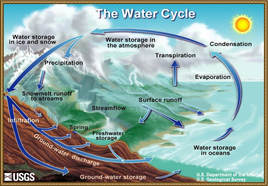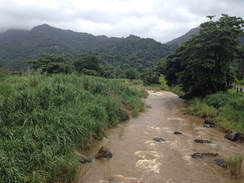GEOL235 Geochemistry of Natural Waters
Why: We live on the blue planet which is ¾ covered by water and 100% of all living organisms require some form of water to survive. It’s simple, no water- no life. Yet freshwater demand already exceeds supply in certain areas of this planet and water is becoming the “new oil”. Where does water come from, what controls its composition and what are the environmental challenges we face today concerning our water resources?
How: We will be on the quest for processes that control the geochemistry and quality of natural waters following the concept of the Critical Zone. The Critical Zone is the system that spans from the top of the vegetative canopy all the way down to the actively cycled ground water. We will begin with precipitation chemistry, investigate what happens when precipitation falls on vegetation, infiltrates into organic-rich and minerals soils and percolates into ground water or emerges as streams. In this hands-on course we will be using group work and working with data sets from Critical Zone Observatories to ask and answer questions on processes that control water chemistry.
Course goals:
When:This course is offered every Spring
Who: You need two semesters of inorganic chemistry (CHEM 031 & 032) before you can sign up. This course counts towards the GEOL major, minor, certain ENSC focus tracks, and is approved for graduate credits.
Why: We live on the blue planet which is ¾ covered by water and 100% of all living organisms require some form of water to survive. It’s simple, no water- no life. Yet freshwater demand already exceeds supply in certain areas of this planet and water is becoming the “new oil”. Where does water come from, what controls its composition and what are the environmental challenges we face today concerning our water resources?
How: We will be on the quest for processes that control the geochemistry and quality of natural waters following the concept of the Critical Zone. The Critical Zone is the system that spans from the top of the vegetative canopy all the way down to the actively cycled ground water. We will begin with precipitation chemistry, investigate what happens when precipitation falls on vegetation, infiltrates into organic-rich and minerals soils and percolates into ground water or emerges as streams. In this hands-on course we will be using group work and working with data sets from Critical Zone Observatories to ask and answer questions on processes that control water chemistry.
Course goals:
- Apply the knowledge of solute sources and geochemical reactions to interpret processes controlling the composition of natural waters in the CZ.
- Demonstrate the ability to synthesize processes that impact water geochemistry with concept sketches
- Apply analysis of geochemical data to generate interpretable time-series and correlation plots and test hypotheses
When:This course is offered every Spring
Who: You need two semesters of inorganic chemistry (CHEM 031 & 032) before you can sign up. This course counts towards the GEOL major, minor, certain ENSC focus tracks, and is approved for graduate credits.



